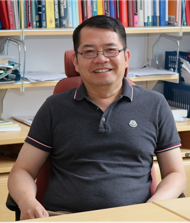Speaker:Hu Xiaoming
Time:Monday, July 22 ,16:00 PM
Venue:Summit Building Meeting Room (7th floor)
Abstract:
In this talk we discuss how to use tools such as non-cooperative differential games, optimal control and manifold theory to achieve emergence for a multi-agent system, in particular non-consensus emergence, which is clearly connected to Distributed Artificial Intelligence (DAI) since group intellectual behavior in DAI is based on individual intellectual behaviors. In many scenarios, agents in a MAS model can act cooperatively, competitively or exhibit neutral behaviors. To handle those complexities, it is very useful to characterize the invariances that define the emergence. Such emergence can be tightly connected to a Nash equilibrium, or rather to an invariant manifold of Nash equilibria. In this talk we will use some cases of study to illustrate our thoughts. We begin with modelling of multiagent systems, then use Turing’s model for the diffusion of morphogens to explore its connection to emergence by self-organization, finally we discuss emergence in a non-cooperative differential game framework in which emergence is achieved by Nash equilibrium strategies in an intrinsic way in the sense that they are only attributed to the inter-agent interaction and geometric properties of the network.
Xiaoming Hu received his bachelor's degree from the University of Science and Technology of China in 1983 and his Ph.D. degree from Arizona State University in United States in 1989 under the supervision of Christopher Byrnes, a well-known expert in nonlinear systems. In 1989 he received a postdoctoral fellowship from the Royal Institute of Technology (KTH) in Sweden , and since 1991 he has been working in the Department of Mathematics at KTH. In 2003, he was promoted to full professor of optimization and systems theory, and is now the head of the optimization and systems theory laboratory. He was the director of the Optimization and System Theory Major, the deputy director of the KTH Robotics Center, a member of the executive committee of the ACCESS Linaeus Center of KTH Network Systems, and a member of the board of directors of the two centers. Professor Hu Xiaoming has led or participated in a large number of research projects from the European Union, the Sweden Research Foundation, the Sweden Strategic Research Foundation, the Logistics Equipment Department and the Sweden Space Center, as well as the organization of a large number of international conferences and editorial boards of international journals. His research interests are mainly nonlinear feedback control, nonlinear observer design, sensing and active perception, modeling, analysis and control of multi-autologous systems, etc., and he is currently a well-known scholar active in the field of international control theory, and won the Outstanding Contribution Award of the 10th Control Theory Professional Committee of the Chinese Society of Automation. He has published more than 200 papers and two monographs.

